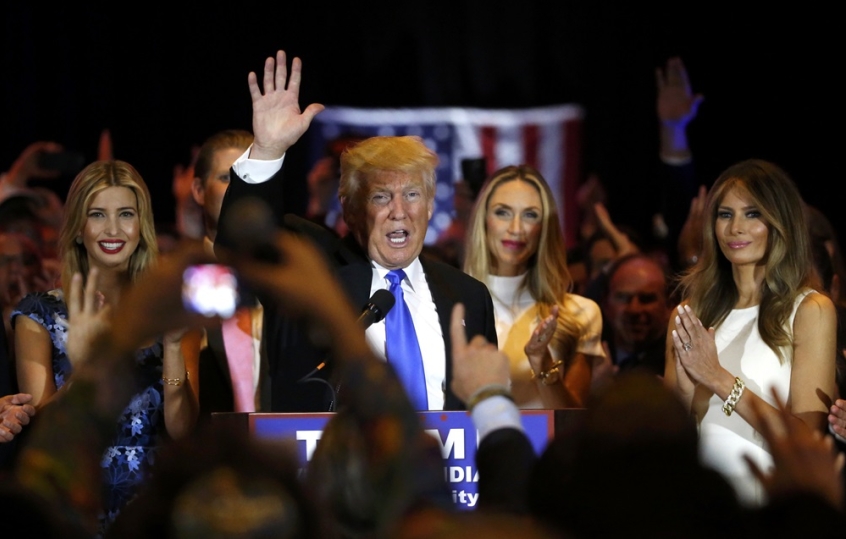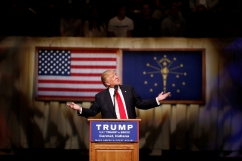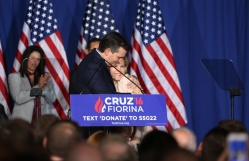
The presumed victory of Donald Trump in the race for the Republican Party nomination for the US presidency has left many evangelicals floundering. In Ted Cruz they saw someone who was morally upright and who ticked all the right boxes on the moral issues they held dear: gay marriage, transgenderism, abortion and religious discrimination. Furthermore, he is a sincere Christian who spoke their language as a native.
Donald Trump, on the other hand, is none of these things. His religious commitment is questionable, as are his sexual ethics, and he is a very late convert to the pro-life camp. As well as his inflammatory language and vulgarity, these are characteristics that will make many churchgoing evangelicals struggle to warm to him.
However, they have no love for his presumed opponent either. Hillary Clinton, for many, is tainted by her association with her husband, whose popularity with the electorate was barely dented by the Monica Lewinski affair. Republicans have been relentless in attacking her over the 2012 Benghazi killings, which saw the murder of US ambassador Christopher Stevens. Most of all, evangelicals struggle with her support for maintaining abortion rights and opposing attacks on Planned Parenthood. She is presented as untrustworthy and unlikeable.
As Al Mohler, president of Southern Baptist Theological Seminary, said in his podcast yesterday: "Christians in the United States are now going to face a very excruciating set of decisions. Many of us are going to be facing the reality that if Hillary Clinton is the Democratic nominee and Donald Trump is the Republican nominee, we will not be able to vote in good conscience for either."
In a thoughtful response to Cruz' withdrawal, Prof Bruce Ashford of Southeastern Baptist Theological Seminary said the 2016 election "an almost-irreplaceable opportunity for evangelicals to redefine ourselves and regain our witness". He said Trump's candidacy offered the chance for evangelicals to criticise both front-runners and would "show that Christian wisdom often defies traditional social and political categories such as Democratic and Republican". He also argued that it was possible to broaden its moral appeal from purely a concern for the unborn to concern for immigrants, refugees and the poor, and that evangelicals could help to heal a "toxic" political culture.
Russell Moore, who has been a fierce critic of Donald Trump, told Baptist Press: "This is a time for Christians to be sober-minded about where our ultimate citizenship and allegiance are located. No amount of political power can fill the void left by abandoning our Christian convictions, so we must keep praying – both for our country's political process and for our churches, that we would be faithful embassies of the kingdom."
However, other prominent evangelicals were more sanguine about a Trump presidency. His supporter Robert Jeffress, senior pastor of First Baptist Church in Dallas, told Baptist Press: "Look, people may have their doubts about Donald Trump's pro-life conversion and his commitment to appoint conservative justices to the Supreme Court. But as I often say, Hillary Clinton doesn't even claim a pro-life conversion and there's absolutely no doubt about what kind of Supreme Court justices she's going to nominate."
While most polls have Hillary Clinton – still, in spite of a continuing strong challenge from Bernie Sanders, the probable Democratic nomination – beating Trump in a head-to-head, nothing can be ruled out after his remarkable rise. He has unquestionably played on xenophobia, racism and sexism, but he has also tapped into genuine issues about jobs and a sense of unease about America's place in the world. The question for evangelicals is whether they will be willing to overlook his serious moral failings in favour of what they believe is his ability to deliver a better quality of life and a greater sense of security.
However, many Christians see genuine dangers in a Trump presidency and are using language of a kind rarely heard in American elections. In a column for RNS, evangelical ethicist David Gushee writes of a call to resist Trump signed by leading theologians and activists, and says: "I am personally heartened that many Americans, including many Republicans and many of my fellow evangelicals, have in their own ways communicated a deep, visceral, fundamental sense that this particular candidate represents a unique kind of danger. I am hopeful that the resistance of decent folk will, in the end, keep him out of the White House."
But he is not sure, and at this stage, neither is anyone else.
Follow Mark Woods on Twitter: @RevMarkWoods















